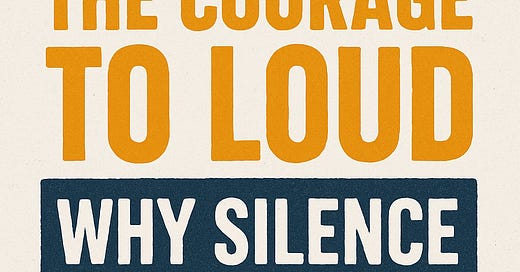Why Silence Isn’t Always Safe
The Virtue of Quietness—And Who It Serves
They told you to be quiet.
To be respectful.
To wait your turn.
To not make a scene.
They told you that loudness was rude.
That volume was aggression.
That silence was strength.
Especially if you were a woman.
Or a child.
Or someone taught that obedience was holiness.
You learned that being good meant being quiet.
But here’s the truth:
Silence doesn’t always mean peace.
Sometimes, it means suppression.
And the people who benefit from your silence
are usually the ones who fear your voice.
They want you quiet—
because your words carry truth,
and truth is disruptive.
When Silence Feels Safe—But Isn’t
Silence can feel like safety—
especially if you’ve been punished for speaking.
If your truth was met with shame,
if your boundaries were broken,
if your questions were labeled rebellion,
you learned:
Stay quiet.
Stay small.
Stay safe.
But that safety is temporary.
Because silence is not neutral.
It’s not passive.
It’s not invisible.
Over time, silence becomes agreement.
It becomes complicity.
And worst of all—
it becomes self-abandonment.
You don’t just lose your voice.
You lose your clarity.
Your peace.
Your place in the world.
Silence stops being a shelter—
and starts being a prison.
Being Loud Isn’t About Volume—It’s About Clarity
You don’t have to yell to be loud.
You don’t have to rage to be heard.
Being loud is not about decibels.
It’s about refusing to disappear.
It’s the friend who finally says,
“That joke’s not funny.”
“This policy harms people.”
“I won’t stay silent while others suffer.”
It’s the survivor who speaks the truth no one wanted to hear.
The protester holding a sign that says We will not be erased.
The leader who says, “This stops with me.”
Loud is clarity.
Loud is presence.
Loud is not hiding anymore.
When the system is built on silence,
your honesty is the disruption.
And sometimes, disruption is the most loving thing you can offer.
The World Has Been Changed by the Loud
The world has never been saved by silence.
It’s been saved by voices that refused to shut up.
By prophets who warned.
By poets who wept.
By mothers who screamed.
By children who asked, “Why?”
By enslaved people who ran.
By marchers who sang.
By citizens who spoke when it wasn’t safe.
They weren’t loud because they were angry.
They were loud because they were alive.
Because truth needs air.
Because healing needs noise.
You don’t have to be cruel to be heard.
But you do have to speak.
You do have to show up.
And when someone tells you you’re too much—
too loud, too intense, too passionate—
you get to say:
“I’m not too loud.
I’m just not quiet for your comfort anymore.”




